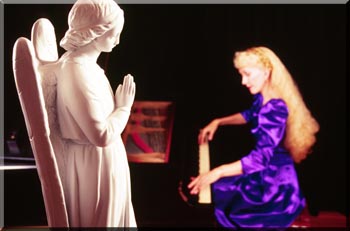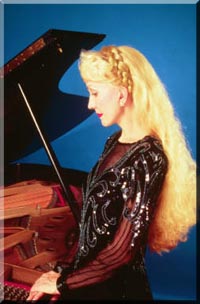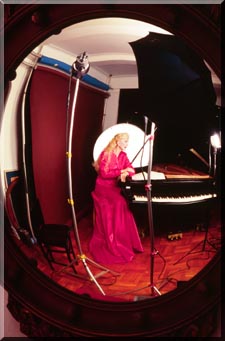Interview with Teresa Walters Rich: "You are performing a very interesting program this evening with works by Rachmaninov, Brahms, Liszt and Gershwin. What can you tell us about this program? Teresa: "Well, I wanted to perform a program which included varied composers. Because I am a Romantic at heart, I chose basically romantic works. The Rachmaninov is a piece I have always loved, and the melodies are so familiar, so audiences really enjoy it. Although this work is traditionally performed in its original version for piano and orchestra, I call my arrangement
Themes from Piano Concerto No. 2. I thought about calling it 'Themes from Rocky 2', but decided upon the more dignified terminology. This season, I wanted to include a work by an American composer, so I chose Gershwin's
Rhapsody in Blue. Rich: Did the fact that Rachmaninov, Liszt, and Gershwin were all concert pianists influence you in any way? Teresa: It certainly makes these works wonderful to perform because these composers understood the instrument so well. Rachmaninov, of course, had a very large hand, and his music shows evidence of that. Most pianists need to roll the big left hand chords that open that piece. My hand stretches enough that I am able to
Rich: "From your photographs, you appear to be a very slender woman, yet you perform some really large and powerful works, and apparently with great success, according to all the reviews." Teresa: "I am tall, so I guess that gives me the advantage of having a certain leverage. But you are correct, my length is greater than my width!" Rich: "I have read that you sometimes stand up over the keyboard to achieve a certain sound. Is that true?" Teresa: "Really? It's not something I intentionally try to do. But I do instinctively know that, especially for a female pianist, it is important to apply all of the upper body weight to the keyboard." Rich: "Why do you say that a female pianist needs to do this?" Teresa: "Because a woman typically does not have the weight in her back, shoulders, and arms that a male pianist has, so she needs to access more weight from the waist up." Rich: "You are known for your performances and recordings of Liszt's music. In fact, your recent CDs have received nominations for the Grand Prix du Disque of the Hungarian Liszt Society. We will hear selections from those recordings in just a moment. In New York recently, you played an all-Liszt performance at Lincoln Center and you received a standing ovation. I don't know many concert pianists who would attempt an all-Liszt program. Wasn't this a particularly challenging program, and why did you decide on this repertoire? Teresa: "I have become increasingly involved and invested in the music of Liszt. At Lincoln Center, I played the Sonata in B minor, his great masterwork. I also included some of his little-known sacred pieces composed later in life. I think we can only fully understand the wonderful creative legacy of Liszt in the context of his personal and artistic development throughout his lifetime". Rich: "You have the honor of being the only American pianist invited to perform three prestigious recitals in Europe honoring the anniversary of Liszt's birth. You performed in Budapest at the Liszt Museum and Academy of Music, at Esterhazy Palace in Austria and at Liszt's Birthplace in Raiding. What was it like to perform in the very places where Liszt was born, lived, and composed?" Teresa: "Because of my love for this music and my respect for the legacy of Liszt, I felt like I was performing on Holy Ground. A special challenge was the fact that those three recitals took place within a 24- hour time frame. So with the travel time involved, the whole experience required a lot of energy and stamina. When the invitations arrived, I thought to myself, 'Can I do this?' These audiences have known and loved the music of Liszt all their lives. It required a lot of courage for me to attempt it, because the invitations humbled me. But when I heard the audiences respond with that wonderful European rhythmic honor clap after the recitals, it was so fulfilling because I knew they had understood what I tried to convey and communicate through the music." Rich: "We certainly look forward to your performance here in Tulsa tonight. We have been talking with Teresa Walters, a concert pianist in great demand throughout the world for her solo recitals and for her performances with orchestras. Teresa, thank you for being with us." Teresa: "It has been my pleasure. Thank you." |



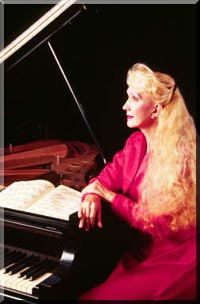 Rich Fischer: "We are talking today with concert pianist Teresa Walters who will perform tonight in the Tulsa Performing Arts Center's twelfth annual Celebrity Piano Concert. She will also be the judge for Saturday's Young Pianist Competition sponsored by the Sarkeys Foundation. Ms. Walters is an internationally acclaimed pianist who is widely considered to be one of the world's most gifted virtuoso pianists. In recent years she has performed as recitalist and orchestral soloist on six continents and in most of the 50 states. The New York Concert Review says 'Teresa Walters has a huge, rolling sound and makes music like an eagle surveying the landscape. This highly gifted Lisztian took the music farther technically and spiritually by her transcendental performance.' Teresa, welcome to the program. It is great to have you with us today."
Rich Fischer: "We are talking today with concert pianist Teresa Walters who will perform tonight in the Tulsa Performing Arts Center's twelfth annual Celebrity Piano Concert. She will also be the judge for Saturday's Young Pianist Competition sponsored by the Sarkeys Foundation. Ms. Walters is an internationally acclaimed pianist who is widely considered to be one of the world's most gifted virtuoso pianists. In recent years she has performed as recitalist and orchestral soloist on six continents and in most of the 50 states. The New York Concert Review says 'Teresa Walters has a huge, rolling sound and makes music like an eagle surveying the landscape. This highly gifted Lisztian took the music farther technically and spiritually by her transcendental performance.' Teresa, welcome to the program. It is great to have you with us today."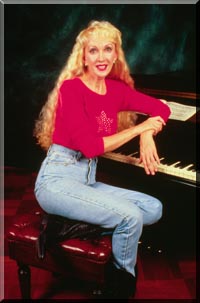 Teresa Walters: "Thank you, Rich. It is a pleasure to talk with you."
Teresa Walters: "Thank you, Rich. It is a pleasure to talk with you."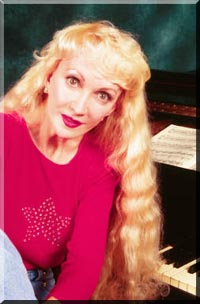 This piece actually exists in three versions. There is the well-known version for piano and orchestra, but there is also a lesser-known two-piano version and this solo piano version which Gershwin played and recorded. The Liszt
Hungarian Fantasy represents the nationalistic output of Liszt, and the Brahms
Intermezzo I have always loved for its intimacy.
This piece actually exists in three versions. There is the well-known version for piano and orchestra, but there is also a lesser-known two-piano version and this solo piano version which Gershwin played and recorded. The Liszt
Hungarian Fantasy represents the nationalistic output of Liszt, and the Brahms
Intermezzo I have always loved for its intimacy.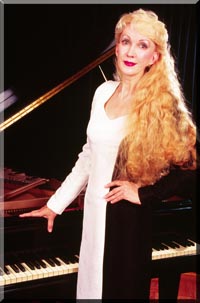 play them as a solid chord, as did Rachmaninov. It's fun for me when male pianists say, 'Let me watch you do that!' Liszt, of course, was probably the world's greatest virtuoso, and his music is extremely difficult to play. But because he understood the piano so well, his music fits the human hand so logically and so idiomatically. I play some sections of the
Rhapsody in Blue slower than Gershwin's recordings. Recent research has shown that the brain tumor from which he died made it impossible for him play slowly. I also like to bring out the spirituality of that piece because some of the themes sound to me almost like African-American spirituals."
play them as a solid chord, as did Rachmaninov. It's fun for me when male pianists say, 'Let me watch you do that!' Liszt, of course, was probably the world's greatest virtuoso, and his music is extremely difficult to play. But because he understood the piano so well, his music fits the human hand so logically and so idiomatically. I play some sections of the
Rhapsody in Blue slower than Gershwin's recordings. Recent research has shown that the brain tumor from which he died made it impossible for him play slowly. I also like to bring out the spirituality of that piece because some of the themes sound to me almost like African-American spirituals."